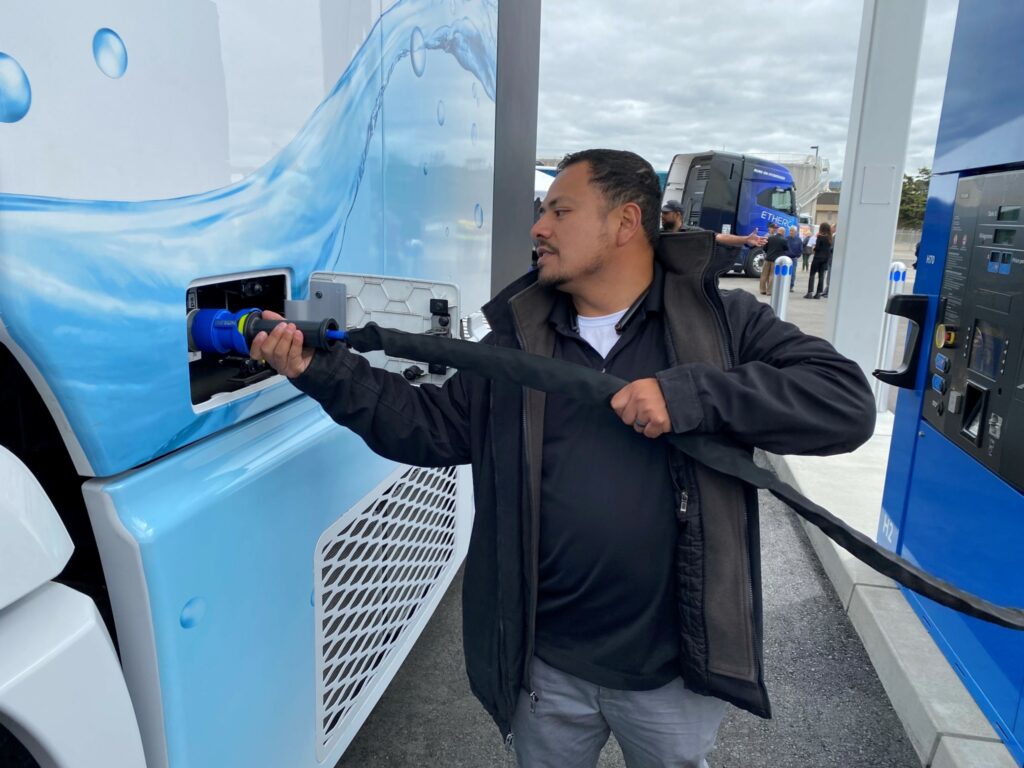Hydrogen fueling is viable, scalable
A recent trip to California offered a glimpse into what trucking in the near future may look like, and there’s a lot to like about it. I was visiting FirstElement Fuel, which had just constructed the first-of-its-kind hydrogen truck stop.
You can read more about it here, but what the biggest takeaway for me was that yes, hydrogen fueling is viable and scalable today. FirstElement proved it. The company was established a little more than a decade ago to do just that.

Founder Shane Stephens set out on a mission to prove hydrogen fueling was a viable way to eliminate tailpipe emissions from cars and, more importantly, heavy trucks. The fledgling company’s first fueling station had just one pump, could only fill cars, and had a capacity of 200 kg of hydrogen a day.
Contrast that to the new heavy-truck station near the Port of Oakland, which can fill trucks with gaseous hydrogen at 700 bar (10,000 psi). This allows it to fill about 200 trucks a day in as little as 10 minutes each.
This is exactly the capacity and throughput needed to make hydrogen fueling practical for heavy-duty trucking. And it’ll only get better. A next-generation cryopump developed by Bosch will further speed up fueling times. And then there’s work being done to fill trucks with liquid hydrogen, for even faster fueling times and greater range.
Battery-electric trucks have a time and a place, but they aren’t yet viable for slipseat operations or duty-cycles that see the truck run around the clock. [And considering the cost of these trucks, you’ll want to run them around the clock]. Charging the batteries simply takes too much time. Hydrogen addresses that for the applications that aren’t a fit for batteries.
What excited me as much as the fueling pumps themselves was the trucks that will call on that station for fill-ups. Hyundai committed 30 Xcient fuel-cell-electric trucks to the project, and FirstElement signed Nikola to a 10-year supply deal to call on the same station.
I got to take a ride in one of the Hyundai trucks and can easily see how these vehicles will transform a driver’s quality of life and job satisfaction. The drayage driver I rode along with couldn’t be happier with his new ride. It’s whisper-quiet. There’s no vibration under the seat of the cabover, where the fuel cells reside. The interior is spacious.
And the driver can quickly and easily fill the truck with hydrogen without smelling like diesel afterwards. Cabovers offer incredible visibility. Hydrogen tanks are mounted to the back of the Xcient’s cab that can store 68 kg of the fuel. Why else do drivers love the trucks? They put out 1,650 lb.-ft. of torque – instant torque, at that – and offer nearly 500 miles (800 km) of range between fills.
This is increasingly looking like the future of longhaul trucking. Hydrogen fuel cells (and let’s not rule out direct injection hydrogen powerplants, either) that produce zero tailpipe emissions and a greatly enhanced driver experience.
Now, we need to bring the same ingenuity and ambition to Canada. And not just in Alberta, where Air Products Canada announced it will build a network of permanent, commercial-scale hydrogen refueling stations.
Or Quebec, where Hydrolux announced plans to build seven hydrogen refueling stations for heavy trucks. But right across this vast country. Hydrogen fuel-cell-electric truck makers are eyeing Canada with great interest.
“I’ve been pushing Canada at Nikola for quite some time now,” said Jorg Wimbert, head of Canada for Nikola, speaking at the Truck World VIP breakfast April 18. “To all of us, Canada is a no-brainer. The citizens, the government, the markets – everybody wants to move to greener technology.”
The time to act is now.
Have your say
This is a moderated forum. Comments will no longer be published unless they are accompanied by a first and last name and a verifiable email address. (Today's Trucking will not publish or share the email address.) Profane language and content deemed to be libelous, racist, or threatening in nature will not be published under any circumstances.